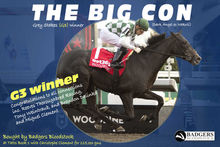Bloodstock Guru is impressed with SA Industry
- www.turftalk.co.za
- Sep 24, 2018
- 3 min read
Grant Pritchard-Gordon of Badgers Bloodstock returned
to his home base Newmarket, UK, on Wednesday after assisting Kerry Jack and John Kramer with the inspection and approval of yearlings for the 2019 Cape Premier Yearling Sale.
“Badger”, as he is known, made some interesting observations about his two-week journey across the Cape and the Karoo visiting a host of South Africa’s leading stud farms.
On a personal level, the busy fortnight allowed Pritchard-Gordon to go to places he’d never seen before and to meet the handful of breeders he hadn’t managed to acquaint himself with on previous trips.
“I closed the circle,” he said. “I’d only been to the Robertson and Franschoek areas before but this time I got to see places like Ceres, Beaufort West, Dordrecht, Graaff-Reinet and parts of the Eastern Cape. Lammerskraal is a beautiful farm. I met Veronica Foulkes of Normandy for the first time, David Hepburn-Brown of Hemel n Aarde, Tim Bootsma of Maine Chance and Eugene Freeman of Boland Stud.
“The landscape was truly amazing. When we drove into Beaufort-West to see Graeme Koster at Rosedene Stud there was snow on the mountains and everywhere. It was so beautiful it blew me away. Graeme, a top man, told me hadn’t seen the snow so prominent in 40 years.”
The Karoo, as a breeding region, impressed Pritchard-Gordon to no end and he said: “I was gobsmacked with the variety of horses. Rosedene was super, Gaynor Rupert’s farm near Graaff-Reinet is spectacular, Gary Player’s old place near Colesberg is fantastic.
“I didn’t get to meet the Birches at Dordrecht, but I heard about their horses. Typical of the Karoo, they grow up the natural way. They are healthy and have good limbs. It’s a pity that the Karoo went out of fashion as a breeding region, though I understand that things are looking more promising for breeders here again.”

Most complimentary about the Eastern Cape’s Ascot Stud, Pritchard-Gordon said: “The Parker family of Ascot are the most charming people and they are proper breeders, what a beautiful place.”
Among the 270-odd young horses he came to view, Pritchard-Gordon said there were some outstanding specimens. He told: “There are a few Captain Al’s around, I saw an absolutely smashing one at Klawervlei Stud with John Koster. At the farm I was impressed with the Pomodoro offspring, also the freshman Coup De Grace. He stamps his foals, they have scope and good legs.
“There were a few Querari’s at Maine Chance that I recall being superb and there was a Vercingetorix colt too, he may have been from Maine Chance – a beautiful horse. I gave him perhaps the highest rating I’ve ever given.”
Pritchard-Gordon noted that the mindset of South African breeders, their view of a yearling sale in January, seems to be changing to the positive. He said: “Many were against it before, but they’re starting to see the benefits. In Australia, the Magic Millions sale is early in January and in New Zealand they have the Karaka Sale in February. The Australians breed horses that are well forward, the New Zealand youngsters are more backward but they don’t mind, it is their only big sale and the graduates from the sale do very well.
“There is a cash flow advantage to a January Sale in that breeders don’t have to wait until April to get paid. There is a safety advantage, so to speak, in that their yearlings are sold in January and in effect miss three months in which they could’ve got hurt. And add to this the fact that yearling buyers often send their horses back to the stud farm to grow and mature, which means that the breeders get paid for their horses at the sale and then get paid to board some of the same horses!”
What impressed Pritchard-Gordon most on his trip?
He asserted: “Undoubtedly the most impressive aspect of the South African industry is that your stud farms are blessed with an abundance of top class staff. I have never seen such skilful and proficient people among ordinary horse handlers in my life, and they come in numbers. They are well taught in horsemanship by your breeders. One thing I can say: Your breeding industry is in very good hands!”



























Comments